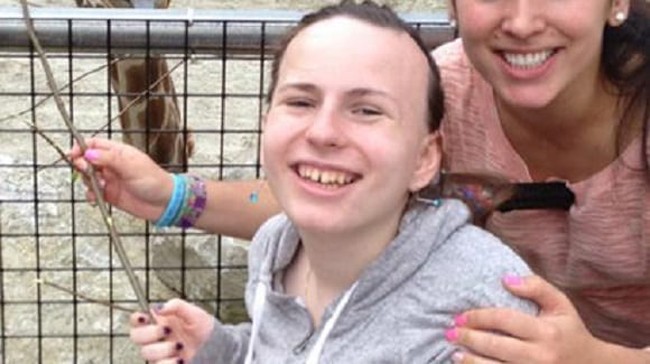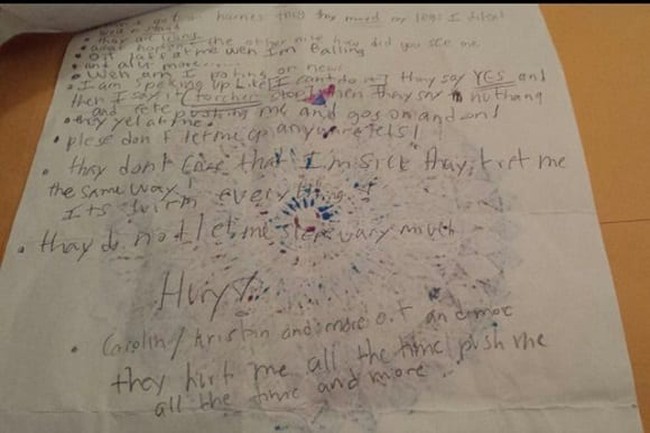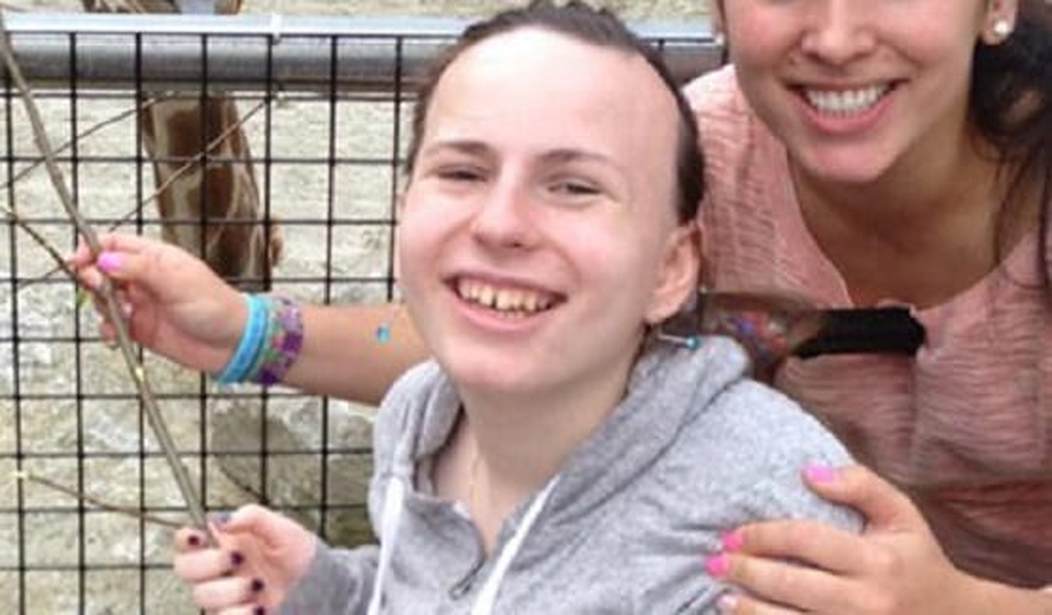
Martin Gottesfeld was featured by Michelle Malkin for defending Justina Pelletier when she was maimed at Harvard-affiliated Boston Children’s Hospital (BCH), leading to his imprisonment without bail by a Harvard-affiliated judge and Obama-appointed prosecutors. See FreeMartyG.com, the FreeMartyG Facebook page, and the @FreeMartyG Twitter account for more info.
Amid all the talk of rising premiums, doomed insurance exchanges, a divided party and an even further divided congress, there’s a unifying narrative that the Republican majority seems to have forgotten about in its rush to repeal and replace Obamacare, and the Democrats should be thanking their lucky stars. After all, what do Donald Trump and Paul Ryan need now more than a surreal but true story for conservative media to tell, elucidating nearly every fear Republicans commonly harbor toward the Affordable Care Act?
This Kafkaesque tale, which dominated the conservative twitterverse, even comes pre-packaged for the right with a poster child from a relatable, underdog Christian family. The girl’s parents end up driven to bankruptcy and are forced to watch, helpless, as their youngest daughter loses the use of her legs and is nearly killed, all at the expense of over a million taxpayer dollars. As told by conservatives, the narrative also includes arrogant and incorrect Harvard doctors who are too proud to admit they’re wrong and who egregiously violate parental and religious rights, with the backing of an at best biased court in the deep blue Commonwealth of Massachusetts.
The potential coup-de-grace for Trump et al.? They could regale their audience with the eventual triumph of American family values in one of the most liberal states in the union. It even culminates with 32 congressmen, including five members of the House Freedom Caucus as well as three Democrats, co-sponsoring a health care bill.
It all began on a cold, snowy, February night, when an ambulance carrying Linda Pelletier and her youngest daughter, 14-year-old Justina, arrived at the Boston Children’s Hospital (BCH) E.R. from Connecticut. For over a year Justina and her older sister had been successfully treated for a rare genetic condition known as mitochondrial disease, or “mito” for short, by Dr. Mark Korson, a leading expert on the illness at nearby Tufts Medical Center. Recently though, Justina had taken a turn for the worse after contracting the flu, which is known to cause serious complications for mito patients. She was having difficulties walking as well as eating, and since mitochondrial disease already interferes with the body’s ability to produce chemical energy from food, her problems were compounding.
Dr. Korson referred Justina to BCH to see his former colleague, Dr. Alejandro Flores, a gastroenterologist who had treated her at Tufts prior to moving his practice across town to BCH the month before. Korson hoped Flores would triage the situation by helping Justina to eat.
However, it wasn’t to be.
When Justina and her mother Linda arrived at the E.R. it was 4 A.M. on a Sunday and Flores wasn’t available. Instead, Justina was seen by Dr. Jurriaan Peters, a young neurologist seven months out of medical training.
According to the Pelletiers, it wasn’t long before Peters took exception to Linda’s assertiveness and declared it was “his case.” He questioned Justina’s mito diagnosis and called for a psychology consult. Then, Simona Bujoreanu PhD evaluated Justina and seemingly rushed to the mistaken conclusion that her physical symptoms had mental causes. Specifically, Bujoreanu wrote that they were psychosomatic in nature, meaning that Justina’s perception of herself as a mito patient was causing her to experience symptoms of the physical disease, similar to the placebo effect.
Based on Bujoreanu’s findings, Justina’s diagnosis was changed from mitochondrial disease, a physical condition, to somatoform disorder, a mental problem. Critics of Bujoreanu point out that she studies somatoform disorder and has authored multiple papers on the condition, potentially leading to confirmation bias.
Regardless, under the new psychological diagnosis, Justina’s mito treatments were unnecessary and even harmful. However, mitochondrial disease is very painful, and can also be degenerative, progressive, and fatal, especially when it is left untreated. So when Harvard-affiliated BCH and its doctors wanted to stop Justina’s mito treatments, her parents fearfully refused and tried to discharge her.
However BCH wouldn’t take “no” for an answer. Instead, the $2 billion dollar Harvard teaching hospital reported Justina’s family for suspected “medical child abuse,” touching off a bitter 16-month custody battle that pitted Boston Children’s and the Massachusetts Department of Children & Families (DCF) against the Pelletiers. Initially, it was a one-sided conflict arbitrated by Commonwealth Family Court Judge Joseph Johnston, who was quick to side with the hospital and state, but slow to accept the possibility the Pelletiers had been right all along.
Backed by DCF and Judge Johnston, Boston Children’s restricted Justina to a single hour-long weekly visit with her family, supervised by armed officers. The Pelletiers weren’t allowed to seek second opinions nor discuss Justina’s treatment with her. She never saw Flores or Korson at BCH. Exacerbating the situation further, she also wasn’t allowed to attend Mass, take Communion, or go to Confession.
It didn’t take long for evidence to surface contradicting the new BCH diagnosis. For example, Boston Children’s had specifically cited Justina’s feeding tube and cecostomy button as potentially unneeded and medically abusive, but almost immediately after the Pelletier’s lost custody of Justina, the hospital changed its tune and determined both to be necessary.
Over the subsequent months, without her mito treatments, Justina’s family reported that she deteriorated rapidly. They told media outlets she was in constant severe pain, that her hair was falling out, her gums were receding, and that she went from figure skating, to having difficulty walking with the flu, to losing all feeling below her waist after BCH stopped her medications. When a local Fox reporter showed up at the courthouse, Judge Johnston issued a gag order forbidding the Pelletiers from speaking to journalists. Unable to tell her family what was happening to her in their supervised visits, Justina took to smuggling them notes hidden in art projects.

Eventually, fear for his daughter’s life led Justina’s father, Lou, to break the gag order. The story was picked up by local media in Boston and also by national conservative outlets including The Blaze, Breitbart, and Fox News. It was widely cited as an example of state-run nanny-care gone terribly, terribly wrong, and it isn’t hard to see why.
In the face of growing public scrutiny, the hospital and state dug in their heels in an apparent effort to avoid admitting they had been wrong, elongating the scandal and the damage to Justina. By the time she went home, the head of Massachusetts DCF had resigned in disgrace and conservative estimates put state spending on Justina’s treatment for the BCH diagnosis at over $1 million — all for a condition she likely never had. Finally, with the Pelletiers on the verge of bankruptcy and Justina on the verge of death, Judge Johnston begrudgingly gave custody back to the family in June 2014, some 16 months after the hospital originally changed her diagnosis.
Unfortunately, Justina has never recovered from the ordeal. She still goes to counseling to cope with the emotional trauma and still requires a wheelchair. After their experience, The Pelletier’s went to Washington D.C., where nearly three dozen congressmen co-sponsored “Justina’s Law,” an effort to stop federal money from being used for similar purposes in the future.
If they wanted to, conservatives today can easily cite the case as a glowing example that when it comes to health care, the state doesn’t always know best and that more money doesn’t always equate to better outcomes. One could even foresee an argument that DCF, BCH, and Judge Johnston were very nearly a death panel for Justina. Regardless, her case clearly underscores the inadequacy of the status quo.
This article is also published at the FreeMartyG Facebook page and HuffPost.













Join the conversation as a VIP Member